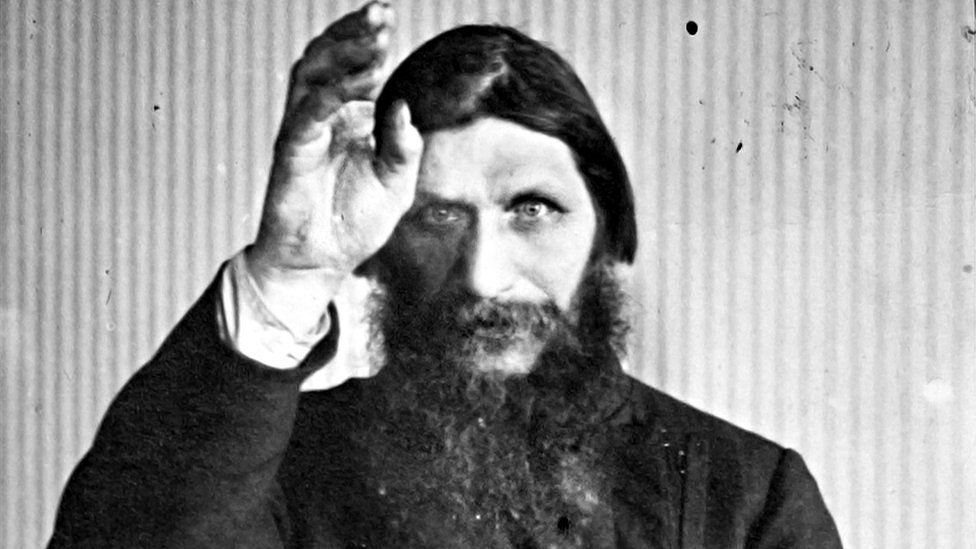Ra Ra Rasputin, Russia’s Greatest Love Machine
Grigori Rasputin, in full Grigori Yefimovich Rasputin, Grigori also spelled Grigory, original name Grigori Yefimovich Novykh, (born January 22 [January 10, Old Style], 1869, Pokrovskoye, near Tyumen, Siberia, Russian Empire—died December 30 [December 17, Old Style], 1916, Petrograd [now St. Petersburg, Russia]), Siberian peasant and mystic whose ability to improve the condition of Aleksey Nikolayevich, the hemophiliac heir to the Russian throne, made him an influential favourite at the court of Emperor Nicholas II and Empress Alexandra.
Although he attended school, Grigori Rasputin remained illiterate, and his reputation for licentiousness earned him the surname Rasputin, Russian for “debauched one.” He evidently underwent a religious conversion at age 18, and eventually he went to the monastery at Verkhoture, where he was introduced to the Khlysty (Flagellants) sect. Rasputin perverted Khlysty beliefs into the doctrine that one was nearest God when feeling “holy passionlessness” and that the best way to reach such a state was through the sexual exhaustion that came after prolonged debauchery.
Rasputin did not become a monk. He returned to Pokrovskoye, and at age 19 married Proskovya Fyodorovna Dubrovina, who later bore him four children. Marriage did not settle Rasputin. He left home and wandered to Mount Athos, Greece, and Jerusalem, living off the peasants’ donations and gaining a reputation as a starets (self-proclaimed holy man) with the ability to heal the sick and predict the future.
In 1905 Rasputin was introduced to the royal family, and in 1908 he was summoned to the palace of Nicholas and Alexandra during one of their hemophiliac son’s bleeding episodes. Rasputin succeeded in easing the boy’s suffering (probably by his hypnotic powers) and, upon leaving the palace, warned the parents that the destiny of both the child and the dynasty were irrevocably linked to him, thereby setting in motion a decade of Rasputin’s powerful influence on the imperial family and affairs of state.
In the presence of the royal family, Rasputin consistently maintained the posture of a humble and holy peasant. Outside court, however, he soon fell into his former licentious habits. Preaching that physical contact with his own person had a purifying and healing effect, he acquired mistresses and attempted to seduce many other women. When accounts of Rasputin’s conduct reached the ears of Nicholas, the tsar refused to believe that he was anything other than a holy man, and Rasputin’s accusers found themselves transferred to remote regions of the empire or entirely removed from their positions of influence.
Rasputin reached the pinnacle of his power at the Russian court after 1915. During World War I, Nicholas II took personal command of his forces (September 1915) and went to the troops on the front, leaving Alexandra in charge of Russia’s internal affairs, while Rasputin served as her personal advisor.
Rasputin’s influence ranged from the appointment of church officials to the selection of cabinet ministers (often incompetent opportunists), and he occasionally intervened in military matters to Russia’s detriment. Though supporting no particular political group, Rasputin was a strong opponent of anyone opposing the autocracy or himself.
Several attempts were made to take the life of Rasputin and save Russia from further calamity, but none were successful until 1916. Then a group of extreme conservatives, including Prince Feliks Yusupov (husband of the tsar’s niece), Vladimir Mitrofanovich Purishkevich (a member of the Duma), and Grand Duke Dmitry Pavlovich (the tsar’s cousin), formed a conspiracy to eliminate Rasputin and save the monarchy from further scandal.
On the night of December 29–30 (December 16–17, Old Style), Rasputin was invited to visit Yusupov’s home, and, according to legend, once there, he was given poisoned wine and tea cakes. When he did not die, the frantic Yusupov shot him. Rasputin collapsed but was able to run out into the courtyard, where Purishkevich shot him again.
The conspirators then bound him and threw him through a hole in the ice into the Neva River, where he finally died by drowning. However, a subsequent autopsy largely refuted this account of events; Rasputin apparently was shot to death then thrown into the icy river. Later his dead body was retrieved and both his arms were chopped off.
SOURCE : Britannica

